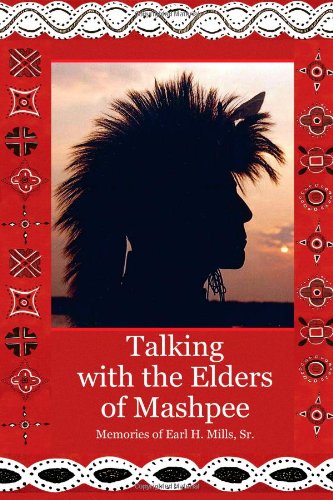
Earl Mills is Chief Flying Eagle of the Mashpee Wampanoag, and has been since a consensus of the tribe asked him to assume that role in 1956. He is a master chef who owned and ran the Flume restaurant. He wrote a wonderful cookbook with native recipes from that time. He authored Son of Mashpee about his recollections of growing up Wampanoag. In his new book, Talking with the Elders of Mashpee, he expands the information of his past work. The book is not only a glimpse of 20th century Indian life but it's very Cape Cod. Living through Prohibition, and the Depression, Mills considered his family “rich.” Good friends, good food, good community – all reflected in his memory archive.
Taping interviews with 12 elders all over 75, between 1970-86, he transcribes even the “Cape Cod twang” of his own father talking at length about how to corn herring. Interviews, photos, and thumbnails describe many interesting details about people such as Eben Queppish, a hunting and fishing guide who also appeared in Buffalo Bill Cody’s Wild West show, or High Eagle (William James), a particularly handsome man, who gave spirit walks accompanied by stories to experience wind, rain, and night itself. Some folks dressed in regalia full time; some had memories of native-speaking relatives still living in wetus; some were the best cooks of muskrat or fried oysters; some granmas knew which herbs to gather, who kept cows, chickens and pigs. Members of famous surnames of M
ashpee, such as Coombs, Pocknett, Peters, Webquish, are well represented.
From an outdoor privy and hand pump to indoors plumbing, from horse and buggy trips that could require a day to get to get to Plymouth via Cataumet and other towns, from descriptions of the town by the Great Water (Massipee) (Mashpee/Wakeby ponds) and the sea at Poponessett where his people celebrated and clam-baked, we see the past. Mills describes the food quest through the year, the what and how of planting and fishing, hunting (for deer, partridge or rabbit), tonging for shellfish, eeling, going after skunk as a delicacy and using its oil as a curative in cold weather; berrying for strawberries, raspberries, blueberries, beach plums; harvesting and curing herring -- and always cooking. The book will make you hungry with its mouth-watering meals.
There is a lot about tribal re-emergence, the search for an identity that had been suppressed that began in the late 1800s and took off with Clinton Haynes, Wild Horse, in the 1930s – emerging more fully with Mills himself, when pan-Indianism began to flourish. Town politics (mostly Republican) as well as tribal organization is illuminated with many archival pieces. There is lots of information about the Indian Meeting House and its reclamation, which Mills was a big part of.
The chief also talks about the history of powwow. He lets us into tribal ceremony, especially the all-important pipe, the sacred tobacco, and other rituals.
He gives us anecdotes about his own growing up, work people did besides their regular jobs, such as scalloping and cranberrying, written with such meticulous detail you could reconstruct these activities from his words. He talks about chores he himself did, work he liked (and some amusing stuff that he did not) and lets us see the daily life of the Cape during World War Two: rationing, blackouts and Victory Gardens.
The book is typical Mills: ebullient, endearing, informative, amusing, wise. I can’t wait for the next one in the series.
_______________________________________________________________________________Just a note from Lea and I this book is available on Amazon for under $15. Here's the link: http://www.amazon.com/Talking-With-The-Elders-Mashpee/dp/1105953394
http://www.amazon.com/Talking-With-The-Elders-Mashpee/dp/1105953394

More Coming Soon!
Really soon - we promise!
Thanks for your patience with us,
Paula and Lea

